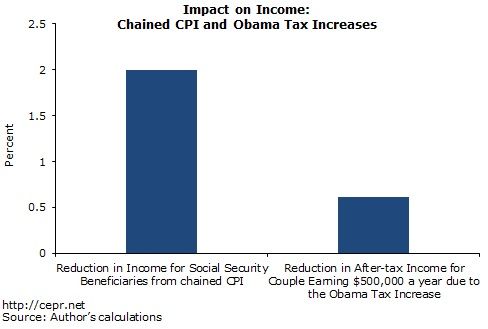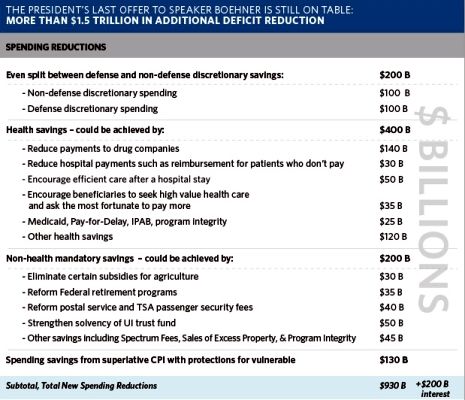Sequestration wasn’t going to happen according to Pres. Barack Obama, but it did. Mostly, because he was naive enough to think that the Republicans would cave because he dangled cuts to Social Security under there noses. Well, that didn’t work out so well. The Tea Party hard liners were adamant about no new taxes and House Speaker John Boehner (R-OH), eager to hold onto his gavel, stood his ground.
We now move to the next manufactured budget crisis on the agenda: the continuing resolution (CR) to keep the government lights on after March 27. If you think that is going to be smooth sailing then you aren’t paying attention. The fight over sequestration could very well lead to a government shutdown:
An aide to Speaker John Boehner (R-OH) said GOP leaders haven’t yet settled on an approach to funding the government. And House Republicans are divided enough that it’s unclear whether they could pass a stripped-down appropriations measure to begin with. Many Republicans would like to use the appropriations process to mitigate sequestration’s defense cuts, or eliminate them by cutting more deeply into domestic spending – a non-starter for Democrats. [..]
“We have had a law that’s in effect; it’s called sequestration,” (Senate Majority Leader Harry Reid (D-NV) said. “Those cuts will go forward. They’re all cuts. I think we need some revenue to take the pressure off everybody. The American people agree with me. And until there’s some agreement on revenue, I believe we should just go ahead with the sequester.”
In other words, Democrats won’t allow Republicans to use a continuing resolution to enshrine sequestration’s lower overall spending requirement by apportioning the cuts in a less indiscriminate way.
Pres. Obama thinks a government shut down can be avoided believing that the Republicans will do the “right thing” and agree to a CR that “adhere to the spending levels they agreed to during the debt limit fight in 2011“:
If House Republicans can’t pass a government funding bill that sets overall spending at levels agreed to in the Budget Control Act – funding that would automatically be reduced because of sequestration – then the government will shutdown and the pressure Republicans feel to cut a deal that both averts sequestration and keeps the government running will intensify. [..]
Thus, if Republicans try to rejigger the sequestration cuts such that they make the lower overall spending levels permanent, but rescind its indiscriminate cutting mechanism and thus remove the pressure on Congress to pass a balanced alternative, they’ll set off a government shutdown fight.
But if Republicans can pass a government funding bill that adheres to spending levels agreed to and set in 2011, then the government will stay open and the fight over sequestration will continue indefinitely.
However the fight over ongoing funding of the government shakes out, Obama said he hopes public pressure convinces Republicans to relent on revenues so that he and Congress can replace sequestration with an alternative deficit reduction plan.
First, the Republicans don’t care about public pressure Second, if Pres. Obama isn’t aware of that then he hasn’t been paying attention and his prediction that the government won’t shut down is as premature as the one about sequestration not happening.
“We agreed to a certain amount of money that was going to be spent each year, and certain funding levels for our military, our education system, and so forth,” Obama said. “If we stick to that deal, then I will be supportive of us sticking to that deal.”
But the implementation of sequestration, particularly its indiscriminate cuts to defense programs, calls into question whether House Republicans will be able to honor the government funding deal without relying on a significant number of Democratic votes. Republicans want to restore some funding to defense programs to mitigate sequestration’s impact on GOP priorities. And that could leave Boehner to choose between keeping his conference united – and thus passing a continuing resolution that the Senate and White House reject – or ignoring internal GOP politics and teaming up with Democrats to keep the government open.
The Republicans in the House have other ideas and have already started planning their end run around the cuts in sequestration they didn’t like by eliminating them in the CR. According to The Hill, they’ve already introduced a funding bill that will “cushion the Pentagon and other agencies from the blow of $85 billion in sequester spending cuts”
It would shift about $10.4 billion into the Pentagon’s operations and maintenance account by cutting other defense accounts, including a $3.6 billion reduction in personnel funds, $2.5 billion less in research and development, and $4.2 billion less in equipment procurement. [..]
In total, the bill includes $518 billion for defense, $2 billion more than President Obama requested this year but the same as in 2012. It assumes the 13 percent cut to non-exempt budget accounts called for by sequestration will occur.
The Republicans are trying to undo the cuts they don’t like while preserving the cuts that the Democrats don’t like and using the CR as an end run around the law.
The Democrats are still reviewing the proposal and have said that they would insist on the same “cushion” non-defense appropriations. There are two scenarios for how this “drama” will play out:
A fight ensues between the House and Senate over the cushions for the Republican’s pet cuts and the Democratic opposition without similar concessions leading to a government shutdown;
Harry Reid gets his orders from the White House, fearing the repercussions of a government shut down, and he puts the House bill up for a vote and it passes with minimum Democratic support.
I’m betting on the latter because Barack already said so.



Recent Comments